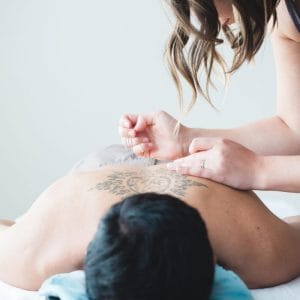What is Acupuncture?
Acupuncture is the insertion of very fine (not much thicker than a hair) needles into specific acupuncture points. These points are located along meridians or channels that connect to the various organs in Chinese medicine. By needling these specific points you can influence the flow of qi (pronounced chee) or energy that flows to the organs. This improves organ function.
What does acupuncture do?
Western medicine research has discovered that it can alter the production of various brain chemicals. This includes neurotransmitters, endorphins, encephalins, painkillers, mood enhancers, natural anti-inflammatories, etc. It is an excellent choice for the treatment of infertility and pain.
The meridians and points are located close to blood vessels, nerves, and lymphatic channels or specific organs. This means that the needles may be communicating with your brain through these nerves.
What conditions does acupuncture help?
Acupuncture can be used to treat any condition, but I find it particularly useful for any condition that involves pain. That includes headache/migraine pain, joint pain, neck pain, upper or lower back pain, period pain or endometriosis pain. It also helps fertility and Bell’s palsy. We also use it to relieve pain in pregnancy safely.
“I don’t like needles, do I have to do acupuncture?”
Not at all. There are many options for a natural treatment that doesn’t involve needles.
Is Acupuncture Safe?
Absolutely, if it is practised by a qualified, competent practitioner.Having practised this natural treatment for 25+ years, I have found that the worst that happens is mild bruising. Also, sometimes there is a lasting sensation where the needle was for up to a day afterwards. The acupuncture needles we use are sterile and disposable, so there is no risk of infection.
Does it Hurt?
Because the needles are not much thicker than a strand of hair, there is not much sensation when they enter your skin. Sometimes people will feel a teeny pinprick. As the needle reaches its destination you may feel a tingly sensation, electrical sensation or deep pressure sensation. But generally not much more than that. And whatever sensation is felt usually subsides within a minute or two of the needle insertion. After that, you may be aware that the needle is there but not really feel much of anything from it.
How Do You Choose Which Points to Use?
The points are on meridians or channels that connect to the different organs in Chinese medicine. Which points to use depends on the problem and the goal of the treatment. This requires an in-depth understanding of TCM. Part the process of making a TCM diagnosis involves looking at the person’s appearance, as well as checking the Chinese pulses on each wrist and examining the tongue.
Where are the Points Located?
Which points we choose depends on the particular condition we are treating. There may be local points used in a particular area of pain, like your neck, back, shoulder, foot, ankle or knee. In addition, we will use points that connect to the channels of the organ systems that aren’t working well.
What is an Acupuncture Treatment Like?
In total, treatment takes about 35-40 minutes. I start by marking where the needles will go by pressing on your skin. Then I will clean that spot with alcohol and insert the needle. Once the needles are all in place they stay in for about 20 minutes. They are then removed and discarded. Each treatment consists of anywhere from about 8-18 needles. Afterwards, most people report either feeling energized or relaxed.
How Can Acupuncture Help?
Studies have shown acupuncture to be helpful in regulating the function of the ovaries in Polycystic Ovarian Syndrome (PCOS). There is evidence that it also helps:
- relieve pain for egg retrieval in IVF
- improve pregnancy outcomes of IVF treatment
- reduce ectopic pregnancy and miscarriage
- manage of ovulation disorders
- helps male subfertility
- relieves primary dysmenorrhea
- helps endometriosis
- relieves menopausal symptoms.
From a Traditional Chinese Medicine(TCM) standpoint you are improving the function of the organs by improving the flow of energy to and from the organ.
From a Western medicine point of view, you are increasing immune system activity in and around the reproductive organs to promote healing and optimal function. You are also directly stimulating nerve endings to stimulate the brain to increase repair activity.
As a naturopathic doctor, I integrate this treatment along with my other healing methods including diet and nutrition, natural supplements, herbs, lifestyle counselling and stress reduction for the maximum impact on reversing infertility and helping women carry healthy pregnancies to term and produce healthy babies.
Book an appointment here or call the office for more information at 416-481-0222.
by Dr. Pamela Frank, BSc(Hons), ND, updated March 27, 2025
Dr. Pamela has practiced as a naturopathic doctor in Toronto since 1999. She has received numerous “Best Naturopath in Toronto” awards. She is registered with the College of Naturopaths of Ontario.
Dr. Pamela Frank uses a natural treatment approach that may include acupuncture, herbal medicine, nutrition, diet, vitamins, supplements, and other natural remedies to restore balance and provide long-term resolution to almost any health problem.
Acupuncture Research
This is just a sampling of the research supporting the use of acupuncture:
For Infertility
Acupuncture as a treatment for infertility shows great results both in men and women. Acupuncture can be considered as a successful treatment in restoring fertility in patients, by improving the sperm quality and ovaries function and balancing the endocrine system and hormones.
Source: Open Access Maced J Med Sci. 2018 Sep 19;6(9):1685-1687. doi: 10.3889/oamjms.2018.379. eCollection 2018 Sep 25. Acupuncture Treatment for Fertility. Zhu J1, Arsovska B1,2, Kozovska K1.
For PMS
The limited evidence available suggests that acupuncture and acupressure may improve both physical and psychological symptoms of PMS when compared to sham control.
Source: Cochrane Database Syst Rev. 2018 Aug 14;8:CD005290. doi: 10.1002/14651858.CD005290.pub2.
Acupuncture and acupressure for premenstrual syndrome.
Armour M1, Ee CC, Hao J, Wilson TM, Yao SS, Smith CA.
For Low Ovarian Reserve
Acupuncture with regulating menstruation to promote pregnancy can safely improve the ovarian reserve of patients with diminished ovarian reserve.
Source: Zhongguo Zhen Jiu. 2017 Oct 12;37(10):1061-5. doi: 10.13703/j.0255-2930.2017.10.009.
Acupuncture with regulating menstruation to promote pregnancy for the diminished ovarian reverse: a prospective case series study. Li X1, Xu H2, Fang Y2, Shang J1, Yang H1, Zhou X1, Zhang M1.
Auricular Acupuncture for Pain
The use of the standard auricular acupuncture protocol in the treatment group led to significant within- and between-group reduced pain severity and interference scores, compared to the control group.
Source: Med Acupunct. 2018 Oct 1;30(5):262-272. doi: 10.1089/acu.2018.1294. Epub 2018 Oct 15.
Auricular Acupuncture for Chronic Pain and Insomnia: A Randomized Clinical Trial.
Garner BK1, Hopkinson SG2, Ketz AK1, Landis CA3, Trego LL4.
For Chronic Pain
This research found that it is effective for the treatment of chronic pain and is, therefore, a reasonable referral option. There were significant differences between true and sham treatments indicating that it is more than just a placebo.
Source: Arch Intern Med. 2012 Oct 22;172(19):1444-53. doi: 10.1001/archinternmed.2012.3654.
Acupuncture for chronic pain: individual patient data meta-analysis.
Vickers AJ1, Cronin AM, Maschino AC, Lewith G, MacPherson H, Foster NE, Sherman KJ, Witt CM, Linde K; Acupuncture Trialists’ Collaboration.

